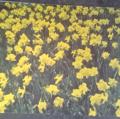Stephanie Jane recenzis Giant de Richard Georges
Stunning poetry
5 steloj
I was entranced by Richard Georges' poetry collection, Giant, from the very first words. With only limited experience of Caribbean literature, I wasn't sure what to expect, but found myself understanding and appreciating his visions out to the ocean from an island home. I felt a sense of timelessness from this poetry too. Connections with creation stories (and scientific truths) from across the globe blend together with memorable imagery such as this initial sentence from Giant:
"Having lost their sight in unlighted deep,
the gods of our fathers rose and strode
towards falling shards of sunlight"
This collection includes such almost mythical poems as well as poems describing specific places. Georges has a sharp eye for seemingly insignificant details and his vivid portrayals of sights as everyday as the angle of plants:
"tamarind trees lean over narrow
coastal roads like wiry grandmothers"
allowed me to clearly envisage Caribbean landscapes as …
I was entranced by Richard Georges' poetry collection, Giant, from the very first words. With only limited experience of Caribbean literature, I wasn't sure what to expect, but found myself understanding and appreciating his visions out to the ocean from an island home. I felt a sense of timelessness from this poetry too. Connections with creation stories (and scientific truths) from across the globe blend together with memorable imagery such as this initial sentence from Giant:
"Having lost their sight in unlighted deep,
the gods of our fathers rose and strode
towards falling shards of sunlight"
This collection includes such almost mythical poems as well as poems describing specific places. Georges has a sharp eye for seemingly insignificant details and his vivid portrayals of sights as everyday as the angle of plants:
"tamarind trees lean over narrow
coastal roads like wiry grandmothers"
allowed me to clearly envisage Caribbean landscapes as he does. We observe goats precariously but blithely feeding by the roadside and, later, see the grotesque image of a lamb who was less lucky with the traffic. We also learn of families blighted by alcoholism and grief.
Giant uncovers many aspects of island life that diverge from the tourist brochure promises, but I never thought that these poems lost hope. There is anger certainly, and a resentment perhaps of a colonial past that still rears its uniformed head from time to time but does not provide the basic resources to ensure that the lights stay on in the people's homes.
Since my initial reading of Giant, I have found myself returning to the book either simply to reread those poems I particularly liked or, more frequently, because a certain concept or turn of phrase suddenly occurred to me and I saw it in a new light. I love that I can continue to interpret and understand Georges' ideas in different ways.

